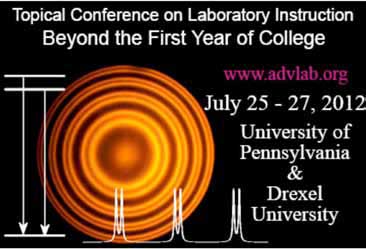Learn More About the Advanced Labs You Teach
David Van Baak, Paul Dolan, Gabriel Spalding
Those of you who teach an advanced laboratory, whether it is your department’s formal “Advanced Lab” course, or a lab that goes along with an upper-level course such as Optics, Electronics or Materials, may feel that you are alone. Survey results indicate that the most likely number of professors who have EVER taught the ‘advanced lab’ at an institution is either two or one. However, you are NOT alone – the Advanced Laboratory Physics Association (ALPhA) was started with you in mind, to create a community of fellow instructors who also teach these labs. Among the first actions of ALPhA was the AAPT/ALPhA Advanced Lab Topical Conference preceding the 2009 Summer AAPT Meeting in Ann Arbor. For those of you who might have missed that meeting (or who just wanted even MORE), put July 2012 on your calendar – ALPhA & AAPT are planning the next topical conference on labs “Beyond the First Year”, to be held on July 25 – 27, 2012, preceding the Summer AAPT Meeting in Philadelphia.
Didn’t learn enough about that ONE experiment you really want to do? Then consider coming to one of the ALPhA Immersions. These are 2 – 3 day sessions that concentrate on a particular experiment, so that you can learn about it in detail, and be prepared to share what you know with your students. The first ALPhA Immersions were held in Summer 2010 at four locations, covering such topics as Pulsed NMR, High Temperature Superconductivity and Saturated Absorption Spectroscopy (to name just a few). The next round of Immersions will be held in Summer 2011 at Bethel University (St. Paul, MN), at Buffalo State College (Buffalo, NY), at Caltech (Pasadena, CA), at Reed College (Portland, OR), at Colgate College (Hamilton, NY), and at the University of Rochester (Rochester, NY). More information on these and other ALPhA initiatives can be found at www.advlab.org.

The authors are members of the Board of ALPhA, and also of the Steering Committee for the 2012 Topical Conference.
Disclaimer—The articles and opinion pieces found in this issue of the APS Forum on Education Newsletter are not peer refereed and represent solely the views of the authors and not necessarily the views of the APS.
